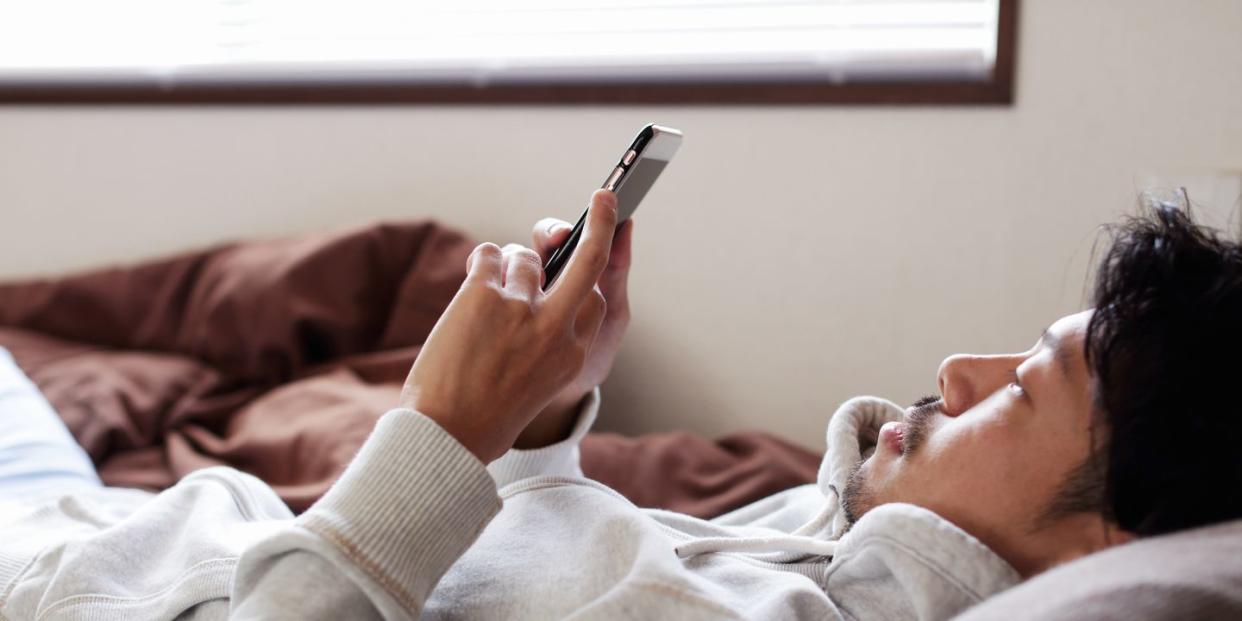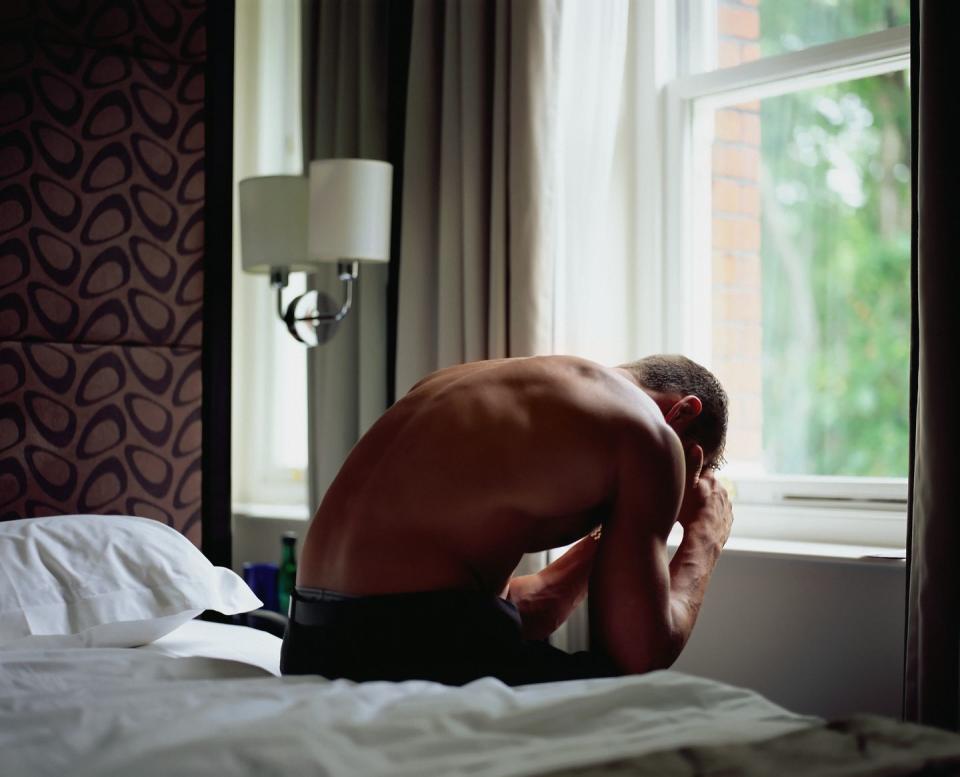To Combat Loneliness More Men Are Turning to Porn

While male loneliness is nothing new – published in 2017, the Jo Cox Commission found that eight million men feel lonely every week. With the coronavirus lockdowns of 2020 heightening the problem and leading to a rise in suicidal thoughts, the government even launched a £750 million campaign titled #Let’sTalkLoneliness to get people to open up.
But, for many men opening up remains a difficult task, especially so when we’re cut off from our friends and colleagues. It’s no surprise, then, that instead of dealing with our emotions, we search out distractions. Distractions like pornography.
According to Fight the New Drug – an organisation that seeks to explore use of pornography by analysing scientific data and case studies – we’re currently in a 'pornography epidemic', which is having a terrible effect on our emotional wellbeing.
'[Porn] offers consumers temporary relief from anxiety, depression, and loneliness in exchange for making these same problems much worse in the long-term,' write the authors of an article titled How The Porn Industry Capitalizes On The Loneliness And Depression Of Its Consumers. Sound familiar?
A Porn Epidemic
Unsurprisingly, porn usage spiked during lockdown. Traffic to porn site PornHub sky-rocketed during March 2020 when it offered free premium membership to Italy, France and Spain, resulting in visitor jumps of 57%, 38% and 61% respectively.
Writing for The New Drug on the spike in PornHub traffic, Tony Porter, CEO of website A Call to Men wrote, 'I’m saddened – but not surprised – to hear that traffic to porn sites is spiking during this time of physical isolation. It means that not only are we more socially isolated than we were before, but far too many of us – especially men – are turning more than ever to dangerous content portraying and celebrating the objectification of women and normalizing violence against women and girls.'
Much has been written about pornography’s derogatory effect. One study found 97% of physically aggressive acts in porn were directed towards women. Other studies have found that the more pornography a person uses, the more difficult it is for them to become aroused by a real sexual encounter, enforcing unrealistic expectations of your partner’s and your own sexual performance.
According to the New Drug, the sense of guilt or ‘self-concealment’ which accompanies porn use can leave users feeling lonely, and more vulnerable to a range of psychological problems.
'For both male and female porn consumers, their habit is often accompanied by problems with anxiety, body-image issues, poor self-image, relationship problems, insecurity, and depression,' the authors write.
Mark Butler is a mental health strategist and the clinical director of The Bay Retreats rehabilitation programme. He has written extensively about porn usage and argues that porn as a tool to encourage sexual arousal isn’t a problem; the problem is that so few of us use it in that way.
'Porn in and of itself isn’t necessarily damaging to our mental health,' he says. 'But, if it is used (and 75% of it is) as a way to cope with boredom, loneliness or alleviate stress then as with any coping behaviour, it can become a problem. When it is used to excess and becomes a primary way of dealing with overwhelming anxiety or stress it begins to interfere in our normal day and that is a problem.'
In other words, more and more of us are using porn as a way of escaping our real feelings and emotions.

Porn Can Lead to Loneliness
James (not his real name) is in his late twenties. He has a good job and close circle of friends but says he often turns to porn when he feels down.
'I’ve been single for quite a while now,' he says. 'I’m often required to work long hours taking calls from clients in international markets, which means I don’t have a lot of time for socialising or dating. Porn is easy to turn to because it’s right there. I suppose it is easy to get attached to your favourite actresses and forget about everything for a while. But you do feel lonelier afterwards, and a bit stupid for getting lost in this fantasy world when in real life you don’t have that special person to spend time with.'
James isn't alone in suffering from a very real problem. Writing for the Institute for Family Studies, Butler outlines a study he and his colleagues carried out in which they found that as pornography use increases, loneliness also increases. And as loneliness increases so too does porn use.
'Our study suggests a close and painful partnership between pornography and loneliness for some users,' Butler explains.
He goes on to hypothesise why this might be so:
'Pornography triggers the sexual system, providing a physical 'feel-good' experience overshadowing negative feelings… Pornography also expands the sexual system’s escape through creating sexual anticipation, bringing a person 'under the influence' of sexual arousal for as long as they care to be before acting out.'
Crucially, by engaging with porn, we’re missing out on a key biological aspect of arousal, and by doing so are furthering our sense of loneliness.
'The sexual system is biologically and neurologically tied to a relationship experience,' Butler explains. 'The human sexual system is carefully designed to support both conception and bonding. First, there’s the physical pleasure of arousal, intercourse, and climax – the engine designed to ensure offspring. Then, after climax, partners experience the brain’s 'love' plan for pair bonding, when oxytocin is released, producing feelings of comfort, connection, and closeness.'
Butler explains that when porn is used to trigger the first aspect it does offer a temporary relief from feelings of loneliness, tricking the brain into thinking it is having a real relationship. Afterwards, realising we are actually alone, Butler believes we can feel a deeper loneliness than before.
Sam Louie is a psychotherapist and author of a number of books including Asian Shame and Addiction: Suffering in Silence. He believes those relying on porn are often suffering from an overwhelming sense of purposelessness.
'They may have a great-looking life, such as a nice home, job, and family, but their internal core is askew. They feel spiritually empty and devoid of substance and may resign themselves to using porn or sex as a way to ease the pain,' he writes in a blog post for Psychology Today.

Increasingly, men are looking to ‘ease the pain’ with reassurance from porn stars themselves. Today, a whole plethora of porn stars are more than happy to record a personalised message for you – for a fee, of course.
In his Audible series The Butterfly Effect, Jon Ronson explains that one fan even requested his favourite porn star record him a message telling him not that he possessed an organ of epic proportions and that his sexual prowess was legendary, but that he was loved, and that everything would be OK. Underlying his sexual excitement was simply a need to feel that another person cared for him – even if that person was a professional actress he was never likely to meet.
'On another level pornography can be addictive because we yearn to be connected, loved, validated and 'seen' by our romantic partner,' Louie explains. 'The rush of feeling unconditionally wanted, validated, or cared for (even via fantasy like porn or prostitutes) can be so powerful, some people can be susceptible to a measure of compulsivity/addiction.'
Porn Addiction or a Harmless Distraction?
Distracting ourselves from feelings of emptiness or loneliness is nothing new. We’ve been doing it through alcohol, drugs, obsessive work hours, obsessive gym routines, video games, gambling and more for as long as these things have been available. Is pornography any more harmful?
'Addiction is addiction but some forms are more acceptable in society than others (e.g. video games, exercise, work),' says Louie. 'The difference is that porn impacts relationships to another degree due to the hurt the other party often feels such as sexual betrayal or sexual inadequacy – not to mention the emotional void that's often left when someone is compulsively engaging in porn.'
A better question to ask, Louie believes, is 'how does porn impact your relationship with your significant other? How does it impact your mental health, and how does it impact your goals and aspirations for life?'
'When we use porn for emotional regulation or self-soothing reasons, as opposed to using it for sexual gratification, it meets a different need,' adds Butler. 'When it is one’s primary way of dissipating emotions like loneliness or boredom or sadness, it is not the healthiest way of being with our feelings and we never learn to develop healthy relationships with ourselves.'
If you’re concerned that porn is becoming a frequent impulse, try getting out for a run, practicing yoga or engaging in mindfulness instead – all of which help us tune in to our underlying emotions so that we can deal with them in a healthier way. And now more than ever your friends and family would probably appreciate a call to discuss how you’re all coping.
Which isn’t to say cutting out porn use entirely is necessarily the answer.
'Everything in moderation, I would say. But don’t let [porn] become the primary driver of regulating or dealing with feelings,' says Butler. '[Ask] What is the motivation behind it and what ‘reward’ is the expectation about? And, most importantly, is it interfering with an otherwise healthy relationship with a partner and with sex? Being honest about that will give you the answer.'
If you’re concerned you might have a problem with porn take a look at the range of support groups available.
You Might Also Like


